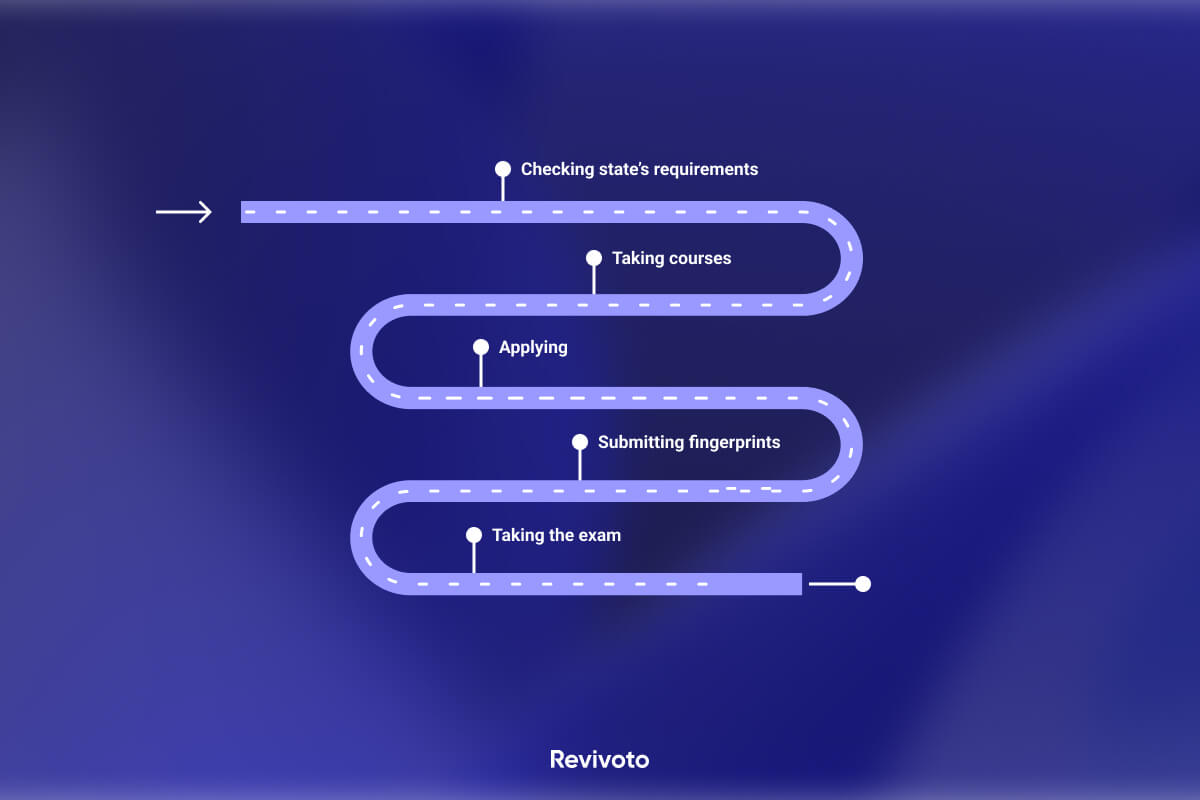“Arriving at one goal is the starting point to another.”
There is always a bigger dragon to slay, right? Too violent? All right, let’s go with “the bigger fish to fry,” then. Becoming a real estate broker is the process of getting the bigger fish. You’re already in the game. You have your license as a real estate agent, and the time has come to take your career to the next level. So, if you are at the start line and considering beginning a career as an agent, you can check out our guide on getting your real estate license.
Similar to your salesperson license, you can expect to go through some steps. The good news is that you now have a couple of years of experience. You’re already a professional who wants to get out of the pond and grow and expand.
As you know, each state has its regulations for getting a broker license, but there are common stops on this road. We will go through them one by one, but first, let’s clarify the domain of real estate brokers.
Table of Contents
Real Estate Brokers’ Job Description
As the title shows, brokers are the focal point of the real estate market. They act as a hub for all the players in the market and their transactions. A broker can:
- Set up a brokerage.
- Hire and supervise agents.
- Prepare property listings.
- Work with clients.
- Market a property.
- Negotiate on behalf of clients.
- Manage an estate.
In a nutshell, brokers can perform all the agent’s tasks plus the ones specific to them.
Different types of brokers
Inside a brokerage, you may come across different “broker” titles:
- Associate broker: They work with an established brokerage. Based on the setting, they can perform the duties of an agent and deal with some office tasks assigned to them.
- Managing broker: They are in charge of the brokerage’s operation and workflow. They can also supervise agents and participate in their training.
- Principal broker/Broker-owner/Representative broker: As these titles indicate, they own the brokerage and oversee all transactions. They are legally responsible for the brokerage business and everyone working under their supervision; they also get their share from agents’ commissions.
All of the above have been licensed as a broker, but they operate at different levels according to their position.
Real estate brokers’ median salary
Your income as a broker depends on many factors, like the area you work in, your dedicated hours, and the generated referrals and leads. According to the U.S. Bureau of Labor Statistics, brokers earn $62,010 on average. The annual wage of brokers goes up to $176,080 at its high. Since brokers work on commission, their earnings depend primarily on how well they can take advantage of their skills and circumstances.
Necessary skills for brokers
Like agents, brokers need specific expertise to succeed in the real estate market, including negotiation, networking, data analysis, communication, marketing, etc. Suppose you are eager to set up your brokerage. In that case, you’ll need additional skills to run your business, like management, finance, legal knowledge, and basic computer skills. You can always hire professionals to assist you in different aspects of your job. Still, a business plan and the ability to execute a marketing strategy to reach your goals are essential.
Using broker license beyond state borders
For brokers who move around and want to set their business near state borders, it is essential to conduct their business effectively but legally. Two policies are available for such brokers: reciprocity and portability. These two depend entirely upon the state’s will, and each state has set rules governing them.
Reciprocity: This rule allows you to get a state’s license while being a licensee in another state. There are different strategies among states regarding this rule: some allow full reciprocity, some do not allow it at all, and others partially offer it, mutually or one way.
| Reciprocity Policy | States |
| Full Reciprocity | Alabama, Colorado, Maine, Mississippi, Virginia |
| No Reciprocity | Alaska, Arizona, California, Delaware, Hawaii, Kansas, Kentucky, Michigan, Missouri, Montana, New Jersey, New Mexico, South Dakota, Texas, Vermont, Washington, Wyoming |
| Partial Reciprocity | Arkansas, Connecticut, Florida, Georgia, Idaho, Illinois, Indiana, Iowa, Louisiana, Maryland, Massachusetts, Minnesota, Nebraska, Nevada, New Hampshire, New York, North Carolina, North Dakota, Ohio, Oklahoma, Pennsylvania, Rhode Island, South Carolina, Tennessee, Utah, West Virginia, Wisconsin |
Getting Your Real Estate Broker License
You are faced with a series of steps to get your individual real estate broker license. Still, since you’ve already gone through the licensure process for a salesperson, you know what lies ahead. There are fewer steps here, but you have more in-depth training courses.In an overview, these are the stages for broker licensure:

Step 1. Check out the state’s requirements
Rules on the brokers’ licensing and operation vary in each state. Therefore, that is your starting point to prepare. The following are the typical requirements among all states.
- Minimum years of experience: Generally, you should have 2-4 years of experience as a licensed real estate salesperson/agent. Depending on your state, some years of experience in the general real estate field or having a degree with a major/minor in real estate can cover the necessary expertise.
- Minimum age: It is usually 18-20.
- Sufficient education: Some states require at least a high school diploma or college-level education regarding the main topics in real estate.
- Residency: you must be a legal resident in the state you are applying for a license.
- Fingerprints and Background check: Getting your fingerprints to match with state and national arrest record databases are standard.
- Qualifying real estate courses: The minimum hours and mandatory topics required differ in each state. States often have a list of approved schools offering courses. Some accept degrees from a college or university covering their related education requirements.
- Passing the license exam: The exam is either held by the responsible real estate entity or is outsourced to a testing center.
- Application fee: The fee is also set by the state, ranging between $100 to $300
Step 2. Take the required courses
The broker license needs more in-depth knowledge, so the mandatory hours are higher than the agent’s pre-license courses. All salespersons must take Continuing Education(CE) state-approved courses to renew their licenses. These are a requirement if you are upgrading to become a broker.
Besides CE courses, you’ll need specified hours on the broker course. Every state has a list of authorized course providers offering Qualifying and Continuing Education.
The qualifying courses entail different subjects; the following are the expected courses:
- Principles of real estate
- Law of agency
- Law of contract
- Promulgated contract forms
- Real estate finance
- Real estate brokerage
Some additional elective courses in real estate appraisal, marketing, math, investment, and property management can be required.
Beware that many states accept academic credits gained through a college or university as qualifying hours for your license application. Once you check your state’s requirements, you can get a clearer picture regarding the necessary training.
Step 3. Submit your application
Depending on your state’s regulations, filling out your application can be either your first step, one you can attend along the way, or the last one. We have put this step in the middle to satisfy all the spectrum.
Most states offer online alongside by-mail applications. With online applications, you either submit the form through your registered account or upload it through the portal. That is where you pay the required fee for getting your broker license; the initial application fee wiggles between $ 100-300, differing among states.
Step 4. Background check
Having a clear record is a vital part of your application. Some states provide you with Fitness Determination(FD) in advance. If you have doubts about your records, you can use FD and avoid wasting time and money on the process. Through FD, you can check any prior criminal offenses, unpaid judgments, disciplinary actions against you associated with professional or occupational licenses you hold, or performing an unlicensed activity.
Apart from that, getting your fingerprints taken by the designated authority is your next step. Passing your background check is a prerequisite for getting your license. It may take some time, so you can start the process while meeting up your training hours.
Step 5. Take the exam
A testing company usually holds the license exams. You can schedule your examination online through your account or the testing center’s portal.
The written exam comprises around 100 multiple-choice questions on the topics covered in required courses. You can find handbooks and study guides on the exam’s subjects. Various preparation centers also offer online and in-person training and practice tests.
Depending on state rules, you may have to take additional course hours if you fail your test multiple times.
Once you pass your exam and get the results, you can finalize your application and officially request your broker license.
Bonus step. Set up a Business Entity Real Estate Broker
Having your broker license does not equal setting up your brokerage. You’ll need a separate licensing procedure in most states to establish your business entity. Usually, the hardest part is to have a designated broker. So, you are all set with your broker license if you plan to start your own agency. Additionally, you’ll need to complete the necessary applications and submit the required documents (tax account status, managing authority, insurance, etc.) to begin the process.
In the meantime, you can work as an associate or managing broker with any established brokerage.
Final word
As we demonstrated in this blog, it’s not that hard to become a real estate broker. Sufficient training and experience are your most valuable assets on this road. However, becoming a real estate broker is only the first step towards setting up your real estate business. With more power comes greater responsibility. Therefore, you must ensure you stand on solid ground to aim for the next goal.
FAQ
You have various expenses on the way to getting your license:
- Qualifying and continuing courses: $150-800
- Fingerprinting: under $100
- Exam fee: under $100
- Application fee $100-300
Putting these together, your average cost would be under $1000.
To calculate the required time for getting your broker license, you must check your state’s licensure regulations. Typically, these are the steps that take time:
- Taking qualifying and continuing courses: Each state has a set hour credit-some accept relevant college or university credits.
- Preparing for the exam: Depends on your free time for studying.
- Background check: This entails submitting your fingerprints and getting the result of your background check, which differs from one state to another.
- Issuance of license: it can take a couple of weeks to a couple of months.
Considering all the above, it can take around 4-6 months from the start to get your license. Keep in mind that you must fulfill the required years of experience (2-4 years) before starting your application.


